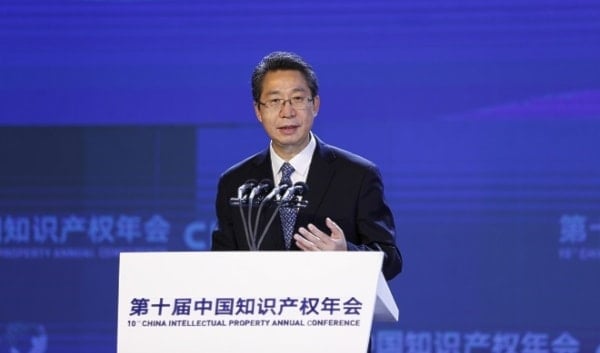China enhances Intellectual Property protection to boost AI innovation
China advances AI development with stronger intellectual property protections, promoting innovation and responsible use of AI technologies.
-

Shen Changyu, Commissioner of the China National Intellectual Property Administration, gives a speech on Sept. 6, 2019 in China (Image provided by CNIPA)
China is intensifying efforts to bolster intellectual property (IP) protection, aiming to provide robust support for enterprises in the rapidly evolving field of artificial intelligence (AI). This initiative seeks to grant Chinese companies a competitive advantage in the global market.
"AI is a key driver of the new round of technological revolution and industrial transformation. Its development has been nothing short of explosive," stated Shen Changyu, head of the China National Intellectual Property Administration (CNIPA), in an exclusive interview with China Daily ahead of World Intellectual Property Day, observed on Saturday.
Adapting IP mechanisms to AI advancements
Addressing the challenges posed by AI in terms of legal frameworks, IP rights, ownership, and responsibility has become a pressing issue for China. "It is urgent and crucial that we adapt our IP protection mechanism to keep pace with the rapid progress," Shen emphasized.
In a recent visit to Zhejiang province, he conducted research on IP protection for AI startups and engaged with company representatives to understand the difficulties they face in patent and trademark applications during a symposium. He instructed IP administrators to maintain regular communication with these businesses to better comprehend their IP protection needs, aiming to resolve issues and stimulate innovation.
"We're planning to establish a patent pool for AI large models to support the sustainable growth of enterprises," Shen announced.
Supporting global expansion of AI enterprises
Shen highlighted the CNIPA's commitment to assisting AI innovators and other businesses in their international ventures. "AI innovators, as well as other businesses going global, will benefit from our more professional and efficient services in handling IP issues overseas, with stronger support provided for preventing IP risks in the course of their international expansions," he noted.
The administration plans to maintain an open and cooperative stance to advance the development of international IP rules that can adapt to the robust growth of AI technologies, fostering increased international cooperation and exchanges in the field.
China's ascendancy in AI innovation
China has witnessed remarkable development in AI innovation, with groundbreaking products from companies like DeepSeek capturing global attention and driving industrial transformation. Shen praised these advancements, particularly those from startups, as evidence of the country's continuous progress in high-level technological innovation.
According to CNIPA data, China granted over 1.04 million invention patents last year, marking a 13.5 percent increase year-on-year. Trademark registrations reached 4.78 million, up 9.1 percent compared to the previous year.
The Global Innovation Index Report 2024, released by the World Intellectual Property Organization, revealed that China is home to 26 of the world's top 100 science and technology clusters, the highest number for any country over the past two years.
"China has become the largest holder of AI-related patents globally. The numbers indicate that the dynamism of China's creation is accelerating, with the innovation momentum in key emerging fields being vigorously released," Shen remarked.
Enhancing IP protection infrastructure
As AI technologies continue to develop and their applications diversify, the number of relevant patent applicants is growing rapidly, presenting new challenges for IP protection. "AI involves multiple IP aspects, including patents, trademarks, copyrights, and trade secrets, so it is vital for innovators to think more about which technologies need protection, what measures need to be taken, and how to leverage IP to enhance their competitiveness," Shen stated.
To address these challenges, the CNIPA has established 77 national IP protection centers, with 62 offering pre-examination services for AI-related patents to over 21,000 registered enterprises and institutions. Last year, these centers received 46,000 pre-examination requests for AI patents, with 31,000 patents granted through expedited review channels, significantly supporting the high-quality development of the AI industry.
Recognizing that AI technologies intersect with various fields such as new-generation information technology, new materials, and high-end equipment manufacturing, Shen emphasized the need for IP protection to meet the diverse requirements of different sectors. "We've stepped up efforts to boost collaborative IP protection systems with other authorities," he said, noting that courts, procuratorates, public security bureaus, and customs have been invited to set up offices in 33 of the national IP protection centers.
"This move is conducive to improving the timeliness, coordination, and effectiveness of administrative and judicial IP protection in emerging fields like AI," he added.
Shen called for local governments and industrial associations to join the IP protection initiative to better embrace fast-developing AI-related technologies and effectively address new challenges.
Read more: Why China’s 5.4% GDP growth in 2025 signals more than just recovery

 5 Min Read
5 Min Read










